线上教学的好处英语作文
线上教学英文作文六级
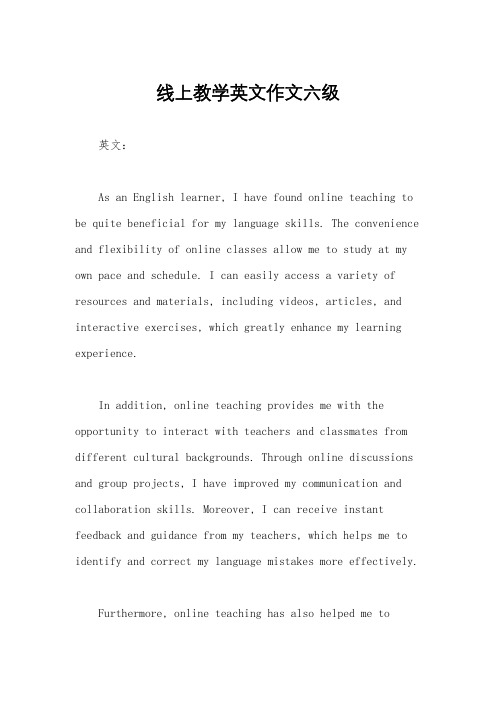
线上教学英文作文六级英文:As an English learner, I have found online teaching to be quite beneficial for my language skills. The convenience and flexibility of online classes allow me to study at my own pace and schedule. I can easily access a variety of resources and materials, including videos, articles, and interactive exercises, which greatly enhance my learning experience.In addition, online teaching provides me with the opportunity to interact with teachers and classmates from different cultural backgrounds. Through online discussions and group projects, I have improved my communication and collaboration skills. Moreover, I can receive instant feedback and guidance from my teachers, which helps me to identify and correct my language mistakes more effectively.Furthermore, online teaching has also helped me todevelop self-discipline and time management skills. I have learned to set goals, stay motivated, and stay organized in order to make the most of my online learning experience. This has not only improved my English proficiency, but also my overall study habits and work ethic.Overall, I believe that online teaching has greatly contributed to my English learning journey, and I am grateful for the opportunities it has provided me to improve my language skills.中文:作为一个英语学习者,我发现线上教学对我的语言能力非常有益。
线上教学的优点作文英语
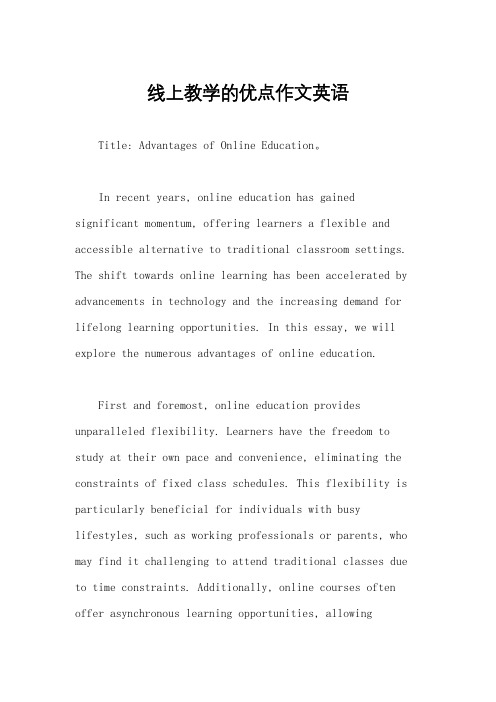
线上教学的优点作文英语Title: Advantages of Online Education。
In recent years, online education has gained significant momentum, offering learners a flexible and accessible alternative to traditional classroom settings. The shift towards online learning has been accelerated by advancements in technology and the increasing demand for lifelong learning opportunities. In this essay, we will explore the numerous advantages of online education.First and foremost, online education provides unparalleled flexibility. Learners have the freedom to study at their own pace and convenience, eliminating the constraints of fixed class schedules. This flexibility is particularly beneficial for individuals with busy lifestyles, such as working professionals or parents, who may find it challenging to attend traditional classes due to time constraints. Additionally, online courses often offer asynchronous learning opportunities, allowingstudents to access course materials and participate in discussions at any time, from anywhere with an internet connection.Furthermore, online education transcends geographical boundaries, enabling access to high-quality educational resources regardless of location. In traditional education systems, individuals residing in remote or rural areas may face limited access to educational institutions or specialized courses. However, online learning platforms democratize education by breaking down these barriers and providing equal opportunities for learners worldwide. This global reach not only fosters cultural exchange and collaboration but also creates a more inclusive learning environment.Another advantage of online education is its cost-effectiveness. Compared to traditional brick-and-mortar institutions, online courses often have lower tuition fees and eliminate additional expenses such as commuting, accommodation, and course materials. This affordability makes education more accessible to a broader range oflearners, including those from socioeconomically disadvantaged backgrounds. Additionally, online learning allows students to save time and money by eliminating the need for expensive textbooks, as many digital resources are freely available or offered at reduced prices.Moreover, online education offers a personalized learning experience tailored to individual needs and preferences. Through adaptive learning technologies and data analytics, online platforms can assess students' strengths and weaknesses and provide personalized recommendations for study materials and learning paths. This personalized approach maximizes learning outcomes by catering to each student's unique learning style and pace, ultimately enhancing retention and comprehension.Additionally, online education fosters the development of essential digital literacy skills vital for success in the digital age. By navigating online learning platforms, students become proficient in utilizing various digital tools and resources, enhancing their technological literacy and adaptability. These skills are increasingly valued intoday's workforce, where digital fluency is a prerequisite for many professions across diverse industries.Furthermore, online education encourages self-discipline and self-motivation, as learners must take initiative and manage their time effectively to succeed in an asynchronous learning environment. By cultivating these essential skills, online education empowers individuals to become lifelong learners capable of navigating the complexities of the modern world.In conclusion, online education offers numerous advantages, including flexibility, accessibility, affordability, personalized learning, and the development of digital literacy skills. By harnessing the power of technology, online learning has revolutionized the way we acquire knowledge, breaking down barriers and expanding educational opportunities for learners worldwide. As we continue to embrace the digital age, online education will undoubtedly play a pivotal role in shaping the future of learning and education.。
线上教学的好处和坏处的英语作文
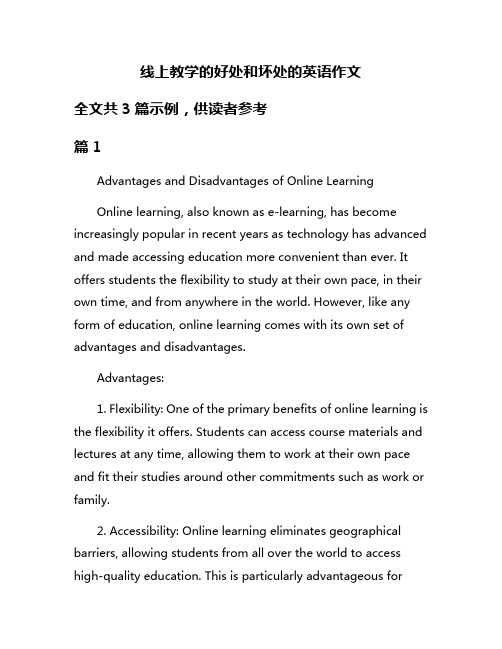
线上教学的好处和坏处的英语作文全文共3篇示例,供读者参考篇1Advantages and Disadvantages of Online LearningOnline learning, also known as e-learning, has become increasingly popular in recent years as technology has advanced and made accessing education more convenient than ever. It offers students the flexibility to study at their own pace, in their own time, and from anywhere in the world. However, like any form of education, online learning comes with its own set of advantages and disadvantages.Advantages:1. Flexibility: One of the primary benefits of online learning is the flexibility it offers. Students can access course materials and lectures at any time, allowing them to work at their own pace and fit their studies around other commitments such as work or family.2. Accessibility: Online learning eliminates geographical barriers, allowing students from all over the world to access high-quality education. This is particularly advantageous forstudents in remote or underserved areas who may not have access to traditional educational institutions.3. Cost-effective: Online learning is often more affordable than traditional classroom-based courses. Students can save money on travel, accommodation, and course materials, and many online courses are offered at a lower tuition fee than their on-campus counterparts.4. Personalized learning: Online learning allows students to learn at their own pace and tailor their study schedule to suit their individual learning style. This can lead to a more personalized learning experience and better retention of information.Disadvantages:1. Lack of face-to-face interaction: One of the biggest drawbacks of online learning is the lack of face-to-face interaction with instructors and peers. This can make it difficult for students to ask questions, seek clarification, and engage in discussions, leading to feelings of isolation and disconnection.2. Limited practical skills: Some subjects, such as science and engineering, require hands-on practical experience that is difficult to replicate in an online environment. This can limit theeffectiveness of online learning for these subjects and may require students to supplement their studies with practical placements or workshops.3. Technology issues: Online learning relies on technology to deliver course materials, communicate with instructors, and complete assignments. This can pose challenges for students who may not have access to reliable internet connections or a suitable device, leading to frustration and delays in their studies.4. Self-discipline required: Online learning requires a high degree of self-discipline and motivation to stay on track and complete assignments on time. Without the structure of regular class meetings and face-to-face interactions, some students may struggle to stay engaged and focused.In conclusion, online learning offers a number of benefits such as flexibility, accessibility, and cost-effectiveness, but it also comes with limitations such as a lack of face-to-face interaction, limited practical skills, technology issues, and the need forself-discipline. As technology continues to evolve, it is likely that online learning will become an increasingly important part of the education landscape, and it is important for students and educators to understand both the advantages and disadvantages of this mode of learning.篇2Advantages and Disadvantages of Online TeachingAs technology has continued to advance, the way we learn and teach has evolved as well. One major trend in education in recent years is the rise of online teaching. Online teaching offers a range of benefits for both educators and students, but it also comes with its own set of challenges. In this essay, we will explore the advantages and disadvantages of online teaching.Advantages of Online Teaching:1. Flexibility: One of the biggest advantages of online teaching is the flexibility it offers. Students can learn at their own pace and at a time that is convenient for them. This is especially useful for working professionals or students with busy schedules.2. Accessibility: Online teaching allows students to access educational materials from anywhere in the world as long as they have an internet connection. This has made education more accessible to people who may not have had the opportunity to attend traditional classrooms.3. Cost-effective: Online teaching can be more cost-effective for both educators and students. Educators can save money onphysical classroom space and materials, while students can save on transportation and accommodation costs.4. Personalized learning: Online teaching allows for personalized learning experiences, as students can work at their own pace and focus on areas where they need extra help. Educators can also provide individualized feedback to each student.Disadvantages of Online Teaching:1. Lack of face-to-face interaction: One of the main disadvantages of online teaching is the lack of face-to-face interaction between students and educators. This can make it harder for students to stay engaged and motivated, and can also hinder their ability to ask questions and get immediate feedback.2. Technology issues: Online teaching relies heavily on technology, and technical issues such as poor internet connection or software glitches can disrupt the learning experience. This can be frustrating for both students and educators.3. Social isolation: Online teaching can lead to social isolation for students, as they may miss out on the socialinteractions and networking opportunities that come with traditional classroom settings.4. Lack of practical experience: Some subjects, such as science or art, require hands-on practical experience that may be difficult to replicate in an online setting. This can limit the depth of learning that students can achieve.In conclusion, online teaching offers a range of benefits such as flexibility, accessibility, cost-effectiveness, and personalized learning experiences. However, it also comes with disadvantages such as lack of face-to-face interaction, technology issues, social isolation, and lack of practical experience. Educators and students must weigh these pros and cons carefully to determine if online teaching is the right fit for their learning needs.篇3The development of technology has greatly changed the way education is delivered, with online teaching becoming more and more popular in recent years. There are many advantages and disadvantages to online teaching, and it is important to weigh both when considering the pros and cons of this method of instruction.One of the main benefits of online teaching is flexibility. Students can access their lessons at any time and from any location, which is especially helpful for those who have busy schedules or live far away from a physical classroom. This flexibility allows for greater convenience and can help students better balance their academic and personal responsibilities.Another advantage of online teaching is the ability to personalize the learning experience. With online platforms, instructors can tailor their lessons to individual students' needs and provide additional resources and support as needed. This can lead to a more personalized and effective learning experience for each student.Online teaching also has the potential to reach a wider audience. With the internet, students from all over the world can access high-quality education without having to travel to a physical location. This can help bridge the gap between different communities and provide more opportunities for individuals who may not have had access to traditional education.However, there are also disadvantages to online teaching. One major drawback is the lack of face-to-face interaction between students and instructors. This can make it more difficult for students to ask questions, engage in discussions, and receiveimmediate feedback on their work. It can also hinder the development of important social skills that are often acquired in a traditional classroom setting.Additionally, online teaching can be challenging for students who struggle with self-discipline and motivation. Without the structure of a physical classroom, some students may find it difficult to stay focused and keep up with their coursework. This can lead to poor academic performance and a lack of engagement in the learning process.In conclusion, online teaching has its benefits and drawbacks. While it offers flexibility, personalization, and access to a wider audience, it may also lack the personal interaction and support that traditional classrooms provide. It is important for educators to consider these factors when deciding whether online teaching is the right choice for their students. Ultimately, a combination of online and traditional teaching methods may provide the best of both worlds and ensure a well-rounded education for all students.。
线上教学英语作文范文
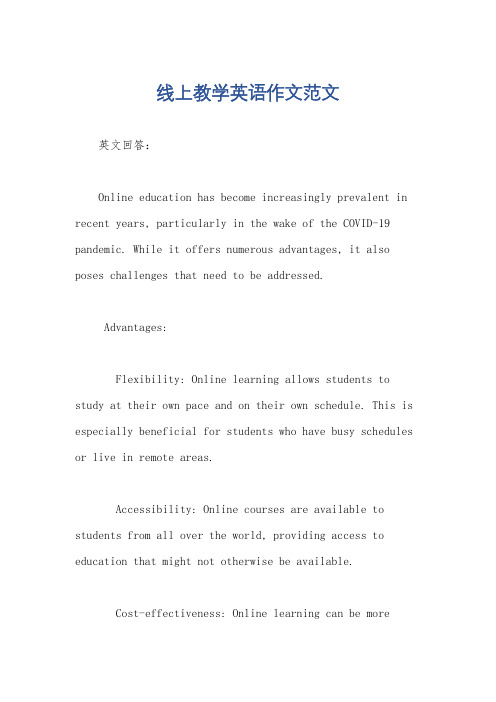
线上教学英语作文范文英文回答:Online education has become increasingly prevalent in recent years, particularly in the wake of the COVID-19 pandemic. While it offers numerous advantages, it also poses challenges that need to be addressed.Advantages:Flexibility: Online learning allows students to study at their own pace and on their own schedule. This is especially beneficial for students who have busy schedules or live in remote areas.Accessibility: Online courses are available to students from all over the world, providing access to education that might not otherwise be available.Cost-effectiveness: Online learning can be moreaffordable than traditional face-to-face instruction, as it eliminates the need for physical space and resources.Variety of courses: Online platforms offer a wide range of courses, allowing students to explore different areas of study and specialize in their interests.Challenges:Lack of social interaction: Online learning can lack the same level of social interaction as traditional face-to-face instruction. This can make it difficult for students to connect with classmates and develop a sense of community.Technical issues: Online learning requires reliable internet access and technical devices. Students may experience difficulties if they have limited access to technology or if their equipment is not up to date.Self-motivation: Online learning requires a high level of self-motivation and discipline. Students need tobe able to manage their time effectively and stay engaged with the material without the direct supervision of an instructor.Assessment: Assessing student learning in an online environment can be challenging. Traditional methods of assessment, such as in-class exams, may not be suitable for online learners.To address these challenges, it is important to:Foster social interaction: Instructors should create opportunities for students to interact with each other, such as through online discussion forums, video conferencing, and group projects.Provide technical support: Institutions should offer technical support services to students who experience difficulties with equipment or internet access.Promote self-motivation: Instructors should provide clear expectations, set regular deadlines, and offerongoing feedback to help students stay on track.Develop alternative assessment methods: Instructors should explore alternative methods of assessment, such as online quizzes, portfolio submissions, and peer reviews.中文回答:线上教学的优势:灵活度,学生可以按照自己的节奏和时间表学习,这对于日程繁忙或居住在偏远地区的学生特别有益。
线上教育好处英文作文

线上教育好处英文作文英文:Online education has become increasingly popular in recent years, and it brings many benefits to both students and teachers. Firstly, online education provides convenience and flexibility. Students can learn from anywhere at any time, as long as they have access to the internet. This is especially beneficial for those who have busy schedules or live in remote areas where traditional education is not easily accessible. Secondly, online education offers a wider range of courses and resources. Students can choose from a variety of subjects and even attend classes from different universities around the world. This helps them to broaden their knowledge and gain aglobal perspective. Thirdly, online education is often more affordable than traditional education. Students can save money on transportation, accommodation, and other expenses.Moreover, online education also benefits teachers. Theycan reach more students from different parts of the world, which can enhance their teaching experience and help themto improve their skills. They can also use various online tools and platforms to create interactive and engaging learning experiences for their students.In my own experience, I have taken several online courses and found them to be very helpful. For example, I took an online course on digital marketing, which helped me to improve my skills and advance my career. I also attended a virtual conference on leadership, where I learned from experts in the field and connected with other professionals from around the world.Overall, online education has many advantages and is becoming an increasingly popular choice for both students and teachers.中文:近年来,线上教育越来越受欢迎,它给学生和教师带来了许多好处。
上网课的好处英文作文
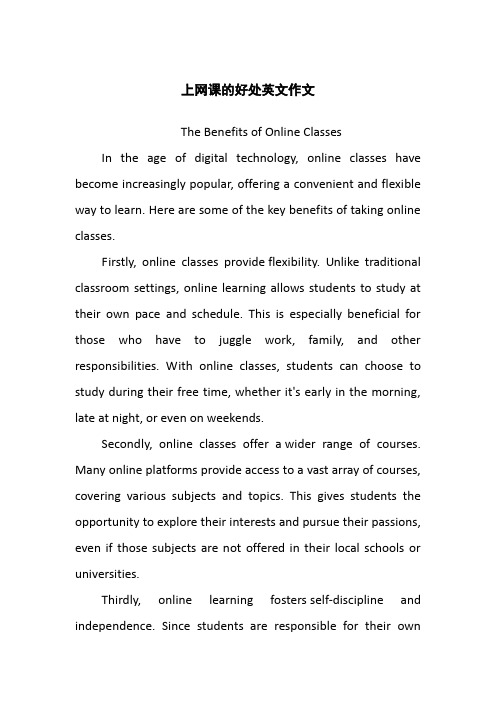
上网课的好处英文作文The Benefits of Online ClassesIn the age of digital technology, online classes have become increasingly popular, offering a convenient and flexible way to learn. Here are some of the key benefits of taking online classes.Firstly, online classes provide flexibility. Unlike traditional classroom settings, online learning allows students to study at their own pace and schedule. This is especially beneficial for those who have to juggle work, family, and other responsibilities. With online classes, students can choose to study during their free time, whether it's early in the morning, late at night, or even on weekends.Secondly, online classes offer a wider range of courses. Many online platforms provide access to a vast array of courses, covering various subjects and topics. This gives students the opportunity to explore their interests and pursue their passions, even if those subjects are not offered in their local schools or universities.Thirdly, online learning fosters self-discipline and independence. Since students are responsible for their ownlearning in an online environment, they learn to manage their time effectively, stay motivated, and complete tasks independently. These skills are crucial for success in both academic and professional settings.Moreover, online classes reduce commuting time and costs. Students no longer have to spend hours traveling to and from school or university, saving them time and money. This extra time can be used for studying, relaxing, or engaging in other productive activities.Lastly, online learning promotes global interaction. Students from different parts of the world can come together in virtual classrooms, sharing their perspectives and experiences. This cultural diversity enriches the learning environment and broadens students' horizons.In conclusion, online classes offer a myriad of benefits, including flexibility, access to a wide range of courses, self-discipline, cost savings, and global interaction. As the world becomes increasingly connected, online learning continues to grow in popularity, providing an excellent opportunity for students to learn and develop in a modern and convenient way.。
线上上课的优势英语作文
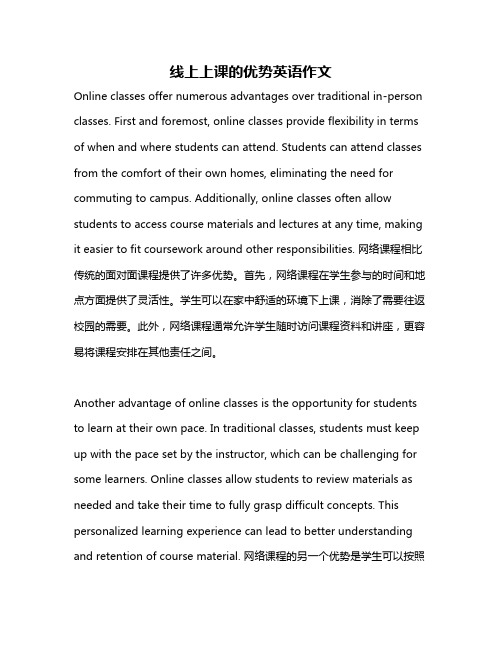
线上上课的优势英语作文Online classes offer numerous advantages over traditional in-person classes. First and foremost, online classes provide flexibility in terms of when and where students can attend. Students can attend classes from the comfort of their own homes, eliminating the need for commuting to campus. Additionally, online classes often allow students to access course materials and lectures at any time, making it easier to fit coursework around other responsibilities. 网络课程相比传统的面对面课程提供了许多优势。
首先,网络课程在学生参与的时间和地点方面提供了灵活性。
学生可以在家中舒适的环境下上课,消除了需要往返校园的需要。
此外,网络课程通常允许学生随时访问课程资料和讲座,更容易将课程安排在其他责任之间。
Another advantage of online classes is the opportunity for students to learn at their own pace. In traditional classes, students must keep up with the pace set by the instructor, which can be challenging for some learners. Online classes allow students to review materials as needed and take their time to fully grasp difficult concepts. This personalized learning experience can lead to better understanding and retention of course material. 网络课程的另一个优势是学生可以按照自己的节奏学习。
网络教学的好处的英语作文

网络教学的好处的英语作文Title: The Benefits of Online Education。
In recent years, online education has emerged as a transformative force in the realm of learning. Its advantages are multifaceted, impacting learners, educators, and institutions alike. Here, we delve into the myriad benefits that online education brings to the table.Firstly, accessibility stands out as a paramount advantage. Online education transcends geographical barriers, offering learning opportunities to individuals regardless of their location. This is particularly beneficial for those residing in remote areas or areas with limited access to traditional educational institutions. Moreover, individuals with physical disabilities or other constraints find online education to be a liberating avenue for pursuing their academic aspirations.Secondly, flexibility is a hallmark feature of onlineeducation. Unlike traditional brick-and-mortar settings, online learning allows students to customize their study schedules according to their personal and professional commitments. This flexibility empowers learners to balance their academic pursuits with other responsibilities, fostering a harmonious integration of education into their lives.Furthermore, online education fosters a conducive learning environment conducive to personalized learning experiences. With the abundance of digital resources and multimedia tools at their disposal, students can tailor their learning journey to suit their unique learning styles and preferences. Whether through interactive simulations, virtual laboratories, or multimedia presentations, online platforms offer a diverse array of instructional modalities that cater to diverse learning needs.Another compelling advantage of online education is its affordability. Traditional education often entails substantial expenses related to tuition fees, commuting, accommodation, and textbooks. In contrast, online coursesare typically more cost-effective, as they eliminate many of these overhead costs. Additionally, the proliferation of open educational resources (OERs) and Massive Open Online Courses (MOOCs) has democratized access to high-quality educational content, further reducing financial barriers to learning.Moreover, online education promotes inclusivity by accommodating diverse learning preferences and needs. For instance, asynchronous learning formats allow students to engage with course materials at their own pace, accommodating differences in learning speed and comprehension. Additionally, online platforms facilitate collaborative learning through discussion forums, group projects, and virtual study groups, fostering a sense of community and camaraderie among learners.From an environmental perspective, online education is also environmentally sustainable. By reducing the need for physical infrastructure and minimizing paper consumption, online learning contributes to the conservation of natural resources and reduction of carbon emissions associated withtraditional education.In addition to benefiting learners, online education also offers advantages to educators and educational institutions. For instructors, online teaching provides opportunities for professional development and innovation. Through the integration of educational technologies and instructional design principles, educators can enhancetheir pedagogical practices and reach a broader audience of learners.Furthermore, online education enables educational institutions to expand their reach and impact. By offering online courses and programs, universities and colleges can attract a more diverse student body, including working professionals, international students, and lifelong learners. This diversification not only enhances the cultural and intellectual vibrancy of educational communities but also contributes to the financial sustainability of institutions.In conclusion, online education presents a plethora ofbenefits that transcend traditional boundaries and transform the landscape of learning. From its accessibility and flexibility to its affordability and inclusivity, online education empowers individuals to pursue their educational aspirations on their own terms. As we navigate the evolving landscape of education, online learning stands as a beacon of innovation, equity, and opportunity for learners around the globe.。
- 1、下载文档前请自行甄别文档内容的完整性,平台不提供额外的编辑、内容补充、找答案等附加服务。
- 2、"仅部分预览"的文档,不可在线预览部分如存在完整性等问题,可反馈申请退款(可完整预览的文档不适用该条件!)。
- 3、如文档侵犯您的权益,请联系客服反馈,我们会尽快为您处理(人工客服工作时间:9:00-18:30)。
线上教学的好处英语作文
The Advantages of Online Learning
In recent years, online learning has been popular with the public pared with traditional classroom learning online learning has show its giant advantages.
In general there are three aspects of advantages about online learning. In the first place online learning change passivity of study into the initiative.In the classroom teachers stands on the platform facing lots of students students just accept knowledge passively,even though they have questions after class, teachers can not work it out for them quickly.Online learning is different, it can supply a terrace for students to choose courses and teachers they like at the same time the questions they ask will also be solved in 24 hours. it improves the efficiency and activity of study Second students can schedule their study time properly depending on online learning.Online course make them never be busy with study whenever they like. Third online learning can make information communication easily When searching information in class, you can just make it on internet rather than go to other places like library.
All in all, online learning actually provides convenience of learning for people. we should encourage the public to enjoy the advantages of online learning.。
